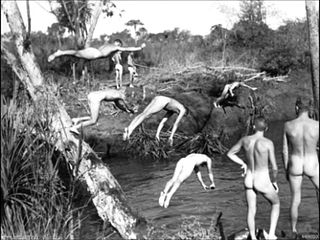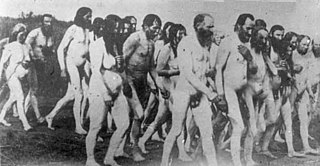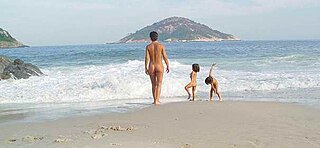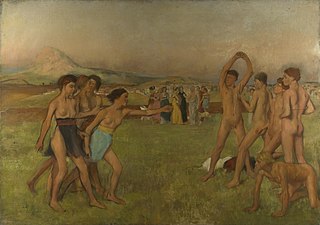The following is a list of nude events (clothing-free events) where people can be naked in public:
The following is a list of nude events (clothing-free events) where people can be naked in public:

Naturism is a lifestyle of practicing non-sexual social nudity in private and in public; the word also refers to the cultural movement which advocates and defends that lifestyle. Both may alternatively be called nudism. Though the two terms are broadly interchangeable, nudism emphasizes the practice of nudity, whilst naturism highlights an attitude favoring harmony with nature and respect for the environment, into which that practice is integrated. That said, naturists come from a range of philosophical and cultural backgrounds; there is no single naturist ideology.

Nude swimming is the practice of swimming without clothing, whether in natural bodies of water or in swimming pools. A colloquial term for nude swimming is "skinny dipping".

Naked yoga is the practice of yoga without clothes. It has existed since ancient times as a spiritual practice, and is mentioned in the 7th-10th century Bhagavata Purana and by the Ancient Greek geographer Strabo.
In film, nudity may be either graphic or suggestive, such as when a person appears to be naked but is covered by a sheet. Since the birth of film, depictions of any form of sexuality have been controversial, and in the case of most nude scenes, had to be justified as part of the story.

The World Naked Bike Ride (WNBR) is an international clothing-optional bike ride in which participants plan, meet and ride together en masse on human-powered transport, to "deliver a vision of a cleaner, safer, body-positive world." The first ride happened in Zaragoza (Spain) in 2001.

A clothing-optional bike ride is a cycling event in which nudity is permitted or expected. There are many clothing-optional cycling events around the world. Rides may be political, recreational, artistic, or a unique combination thereof. Some are used to promote topfreedom, a social movement to accord women and girls the right to be topless in public where men and boys have that right.
A naked party, also known as nude party, is a party where the participants are required to be nude. The parties have become associated with college campuses and with college-aged people; they gained prominence after naked parties were organized at Brown University and Yale University. While the roots of naked parties come from the nudism movements and campus streaking, the modern "naked party" movement appears to have its roots at Brown University in the 1980s. Attendees of naked parties often report that they stop feeling awkward after just a few minutes since everyone has disrobed before entering the party and since everyone's nudity is accepted, regardless of body type. According to reports, most naked college parties are sex-free. At Brown University, the nakedness is "more of an experiment in social interaction than a sexual experience".
Clothing laws vary considerably around the world. In most countries, there are no laws which prescribe what clothing is required to be worn. However, the community standards of clothing are set indirectly by way of prosecution of those who wear something that is not socially approved. Those people who wear insufficient clothing can be prosecuted in many countries under various offences termed indecent exposure, public indecency, nudity or other descriptions. Generally, these offences do not themselves define what is and what is not acceptable clothing to constitute the offence, and leave it to a judge to determine in each case.

The Freikörperkultur (FKK) is a social and health culture that originated in the German Empire; its beginnings were historically part of the Lebensreform social movement in the late 19th century. The Freikörperkultur, which translates to free body culture, consists in the connection of health aspects of being naked in light, air and sun with intentions to reform life and society. It is partially identical with the culture of nudity, naturism and nudism in the sense of communal nudity of people and families in leisure time, sport and everyday life.

Nude recreation refers to recreational activities which some people engage in while nude. Historically, the ancient Olympic Games were nude events. There remain some societies in Africa, Oceania, and South America that continue to engage in everyday public activities—including sports—without clothes, while in most of the world nude activities take place in either private spaces or separate clothing optional areas in public spaces. Occasional events, such as nude bike rides, may occur in public areas where nudity is not otherwise allowed.

The history of nudity involves social attitudes to nakedness of the human body in different cultures in history. The use of clothing to cover the body is one of the changes that mark the end of the Neolithic, and the beginning of civilizations. Nudity has traditionally been the social norm for both men and women in hunter-gatherer cultures in warm climates, and it is still common among many indigenous peoples. The need to cover the body is associated with human migration out of the tropics into climates where clothes were needed as protection from sun, heat, and dust in the Middle East; or from cold and rain in Europe and Asia. The first use of animal skins and cloth may have been as adornment, along with body modification, body painting, and jewelry, invented first for other purposes, such as magic, decoration, cult, or prestige. The skills used in their making were later found to be practical as well.

Nude photography is the creation of any photograph which contains an image of a nude or semi-nude person, or an image suggestive of nudity. Nude photography is undertaken for a variety of purposes, including educational uses, commercial applications and artistic creations. The exhibition or publication of nude photographs may be controversial, more so in some cultures or countries than in others, and especially if the subject is a minor.

Nudity is sometimes used as a tactic during a protest to attract media and public attention to a cause, and sometimes promotion of public nudity is itself the objective of a nude protest. The use of the tactic goes back to well published photos of nude protests by svobodniki in Canada in 1903. The tactic has been used by other groups later in the century, especially after the 1960s. Like public nudity in general, the cultural and legal acceptance of nudity as a tactic in protest also varies around the world. Some opponents of any public nudity claim that it is indecent, especially when it can be viewed by children; while others argue that it is a legitimate form of expression covered by the right to free speech.

Nudity is the state of being in which a human is without clothing. While estimates vary, for the first 90,000 years of pre-history anatomically modern humans were naked, having lost their body hair and living in hospitable climates. As humans became behaviorally modern, body adornments such as jewelry, tattoos, body paint and scarification became part of non-verbal communications, indicating a person's social and individual characteristics. Indigenous peoples in warm climates used clothing for decorative, symbolic or ceremonial purposes but were often nude, having neither the need to protect the body from the elements nor any concept of shame. In many societies, both ancient and contemporary, children might be naked until the beginning of puberty. Women may not cover their breasts, being associated more with nursing babies than with sexuality.

A nude beach, sometimes called a clothing-optional or free beach, is a beach where users are at liberty to be nude. Nude beaches usually have mixed bathing. Such beaches are usually on public lands, and any member of the public is allowed to use the facilities without membership in any movement or subscription to any personal belief. The use of the beach facilities is normally anonymous. Unlike a naturist resort or facility, there is normally no membership or vetting requirement for the use of a nude beach. The use of nude beach facilities is usually casual, not requiring pre-booking. Nude beaches may be official, unofficial, or illegal.

This timeline of social nudity shows the varying degrees of acceptance given to the naked human body by diverse cultures throughout history. The events listed here demonstrate how various societies have shifted between strict and lax clothing standards, how nudity has played a part in social movements and protest, and how the nude human body is accepted in the public sphere.

World Naked Gardening Day (WNGD) is an annual international event generally celebrated on the first Saturday of May by gardeners and non-gardeners alike.

Naturism refers to a lifestyle of practising non-sexual social nudity in private and in public, and to the cultural movement which advocates and defends that lifestyle. Both are also known as "nudism". Naturist organisations have existed in New Zealand since the 1930s. Although not a daily feature of public life, social nudity is practised in a variety of other contexts in New Zealand culture.
Nudity in live performance, such as dance, theatre, and performance art, include the unclothed body either for realism or symbolic meaning. Nudity on stage has become generally accepted in Western cultures beginning in the 20th century.